‘Thriving, not just surviving’ – discussing work-life balance with Therapeutic Radiographer Melanie Clarkson
Like many, Melanie Clarkson is no stranger to trying to balance work and life – but high workloads and staff fatigue require more than just a change in mindset. Synergy explores her call for a ‘cultural shift’

Burnout is more than just a workplace buzzword. The stress of high workloads combined with staff vacancies and budget cuts, as well as the rising cost of living, is having real, impactful consequences not just for patients but also for staff in hospitals across the country. Melanie Clarkson, senior lecturer and Therapeutic Radiographer at Sheffield Hallam University, identifies herself as “an expert by experience”, having suffered her own fair share of work-life imbalance.
At this year’s UK Imaging and Oncology conference, held on 2-4 June, Melanie presented a series of sessions exploring how individuals and departments within trusts can build a supportive workplace culture, normalise how work-life balance looks for individuals and prioritise wellbeing across the profession. These sessions also focused on the significance of personal self awareness strategies for managing stress and anxiety, particularly for managers and leaders who often face isolation within their roles.
Synergy asked Melanie to break down the importance of – and methods of ensuring – a balanced and supportive work environment.
Burnout is more than just a workplace buzzword. The stress of high workloads combined with staff vacancies and budget cuts, as well as the rising cost of living, is having real, impactful consequences not just for patients but also for staff in hospitals across the country. Melanie Clarkson, senior lecturer and Therapeutic Radiographer at Sheffield Hallam University, identifies herself as “an expert by experience”, having suffered her own fair share of work-life imbalance.
At this year’s UK Imaging and Oncology conference, held on 2-4 June, Melanie presented a series of sessions exploring how individuals and departments within trusts can build a supportive workplace culture, normalise how work-life balance looks for individuals and prioritise wellbeing across the profession. These sessions also focused on the significance of personal self awareness strategies for managing stress and anxiety, particularly for managers and leaders who often face isolation within their roles.
Synergy asked Melanie to break down the importance of – and methods of ensuring – a balanced and supportive work environment.

Ups and downs
The first thing Melanie wanted to emphasise is that struggling to maintain a positive work-life balance is normal, and that she would like to see a change in mindset where work-life balance is not a destination but a journey, where each week, or even each day, the balance is different – “and that’s OK!”
“I’m not an expert as a psychologist, but an expert by experience,” she said. “I’ve been there where you feel overwhelmed by everyone needing your time and pushing their priorities. I certainly haven’t perfected this – it’s very much ‘do as I say, not as I do’.
“My main message is to promote the need for self reflection, to understand yourself and your priorities, and this will support normalising your individual work-life balance.
“I may not always practice what I preach, and I think many of us are guilty of that! We’re often told to look after our wellbeing and, while that’s important, it can sometimes feel like just another responsibility handed down to us.”
Melanie reflected on how aspirational goals around career and wellbeing are frequently set from above with the best intentions, aiming to support staff (think during Covid when there were a lot of wellbeing resources being shared). But too often, they become just another box to tick. What’s really needed is a broader cultural shift within the profession – one that moves us beyond simply surviving and instead focuses on truly thriving.
While it wouldn’t be easy to implement wide-ranging changes within an organisation like the NHS, Melanie was eager to share her practical steps with managers, trusts and radiographers on the ground to help them implement these changes in their own institutions. “I’m really keen that our managers and leaders are not forgotten, and academic staff as well,” Melanie added. “Those roles and areas are under an awful lot of stress and strain. I think it’s just holistically looking at the whole profession, and how we can support each other.”
These roles are, unfortunately, often isolated – managers are often seen as the role model and leader, caring for their team to their own detriment. Melanie wants to ensure people are asking the right questions about their support. Being able to regularly and collectively discuss wellbeing at work and break through that isolation will help the entire team become empowered to look after each other and themselves.

‘I often wonder how I ended up here’
Working so frequently in the advanced practice space has allowed Melanie a lot of room to familiarise herself with methods of retaining the workforce and ensuring the profession isn’t losing more radiographers than it’s gaining. “I often wonder how I ended up here, but I think it’s just because I feel really passionate about my profession,” she explained. “In terms of retaining our workforce, if you don’t allow radiographers to feel valued, to develop and apply their skillset, then that has an impact on their wellbeing. They go hand in hand. That’s why the pattern has continued.”
Melanie runs an MSc programme in advanced clinical practice, after taking advantage of the various opportunities that have come her way in developing the profession. However, she warned that saying yes to everything has negatively impacted her wellbeing. “You have to find the balance, but you don’t want to miss out on opportunities,” she said. “Wellbeing is a very personal thing that you have to try to manage. For some, their role at work is significant to them, with their work-life balance perhaps tipping more towards work, while someone else’s might tip the other way. But if there is a priority at home or work, the balance may shift again. The balance is constantly moving, like shifting sands.”
When Melanie feels overwhelmed, she said her first step is to remember to breathe. “I don’t breathe properly when I’m stressed,” she admitted. “So, I start taking deep, sighing breaths, and I try to step away from everything, and talk to friends and colleagues who are very good at being able to rationalise things.
“Being still, in a meditative state, doesn’t necessarily work for me, because my brain is too active. Walking, going to the gym, being with my children – more of a distractive element works for me, which is why I push so much around self awareness. If you don’t understand how you react in those situations, or what works for you, then you are going to feel overwhelmed with the support that’s out there.”
In fact, she added, emotional reflexivity is a skill that’s vital in every part of our lives – taking the time to ask yourself how a situation makes you feel will help to ground you and ensure you focus on your own wellbeing, not just that of others.
That excessive external focus is one example of the bad habits that need to be denormalised from workplace culture.

‘I often wonder how I ended up here’
Working so frequently in the advanced practice space has allowed Melanie a lot of room to familiarise herself with methods of retaining the workforce and ensuring the profession isn’t losing more radiographers than it’s gaining. “I often wonder how I ended up here, but I think it’s just because I feel really passionate about my profession,” she explained. “In terms of retaining our workforce, if you don’t allow radiographers to feel valued, to develop and apply their skillset, then that has an impact on their wellbeing. They go hand in hand. That’s why the pattern has continued.”
Melanie runs an MSc programme in advanced clinical practice, after taking advantage of the various opportunities that have come her way in developing the profession. However, she warned that saying yes to everything has negatively impacted her wellbeing. “You have to find the balance, but you don’t want to miss out on opportunities,” she said. “Wellbeing is a very personal thing that you have to try to manage. For some, their role at work is significant to them, with their work-life balance perhaps tipping more towards work, while someone else’s might tip the other way. But if there is a priority at home or work, the balance may shift again. The balance is constantly moving, like shifting sands.”
When Melanie feels overwhelmed, she said her first step is to remember to breathe. “I don’t breathe properly when I’m stressed,” she admitted. “So, I start taking deep, sighing breaths, and I try to step away from everything, and talk to friends and colleagues who are very good at being able to rationalise things.
“Being still, in a meditative state, doesn’t necessarily work for me, because my brain is too active. Walking, going to the gym, being with my children – more of a distractive element works for me, which is why I push so much around self awareness. If you don’t understand how you react in those situations, or what works for you, then you are going to feel overwhelmed with the support that’s out there.”
In fact, she added, emotional reflexivity is a skill that’s vital in every part of our lives – taking the time to ask yourself how a situation makes you feel will help to ground you and ensure you focus on your own wellbeing, not just that of others.
That excessive external focus is one example of the bad habits that need to be denormalised from workplace culture.

The career river
During her talk, Melanie discussed the obsession with climbing the career ladder. She emphasised the need to look at the idea of one’s career holistically, rather than as simply one more step up the ladder after another. Indeed, pay, although important, is only one metric of value. “I did it, a lot of us will have done it – moved up the career ladder as quickly as I could,” she said. “In hindsight, I would have preferred to have held a role for longer to gain experience, because experiential learning is so beneficial for me as a practitioner. It’s easier in hindsight, because as you move through the ranks everybody wants to be an advanced practitioner, everybody wants to be a consultant practitioner, but who wants to be an academic?
“Who wants to be our operational leader, who wants to be our strategic leader, who wants to be a research radiographer, who wants to look after our patients in terms of the day-to-day practicality? As radiographers, we have an amazing skillset that enables us to look wider than the career ladder.”
Melanie described growth-based career planning as an effective method of changing your mindset from simply pushing upwards to instead exploring how people can grow more fully inside their careers and explore the options available to them.
The diversity of the workforce is a warning against just looking straight ahead, she explained. The Agenda for Change pay spine is not a career ladder, but the terms and conditions of service for your role; however, we have fallen into the trap of identifying individuals and ourselves by our band – how often have you said or heard someone say ‘I need a band 7’? Radiographers can impact healthcare by taking a holistic view of what their career looks like. “It’s a career river, not a career ladder – there are rocks in your way, and the river bends, and unexpected opportunities come up all the time,” she said.
However, she warned that such a mindset isn’t possible without compassionate leadership and reflective spaces. Far too many radiographers describe their job as ‘firefighting’ – simply addressing areas of intense need as they crop up, with no space to rest, relax and recover, which is a sad reality of the current climate. So how do we change this culture?
Using frameworks such as resilience-based clinical supervision (RBCS)/restorative-based clinical supervision, workplaces can move towards a more compassionate workplace. RBCS is the implementation of regular, in-depth meetings with grounding exercises that allow radiographers to check in, reflect on the events that have impacted their wellbeing, and what has helped them to keep going, which can mitigate the negative impacts of fatigue, stress and burnout. But the challenge is finding the time within busy schedules to undertake this. Melanie concluded: “If you’re able to normalise the act of stopping and thinking about what life currently looks like, be that personal or professional, and whether there needs to be a readjustment of boundaries so you can balance everything better, you’re in a much healthier place.
“I appreciate that this culture change can be challenging, but even if you take a moment to reflect during your commute to and from work, or during your break, it can help rationalise the balance. It shouldn’t take a catastrophic incident for you to reflect on where you are – you should be doing it all the time to support your wellbeing.”
More about SoR and wellbeing
For more information on the support for wellbeing the SoR can offer, visit SoR.org.
Read more



